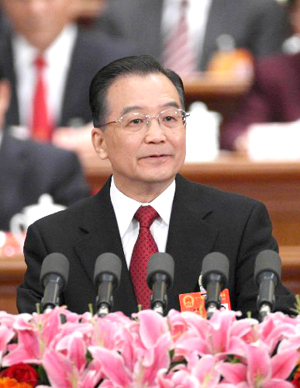China reported drops of energy consumption and pollutant emission in 2007, a positive move toward its five-year environmental goal.
In 2007, China saw a 3.27 percent year-on-year drop in energy consumption for each 10,000 yuan of GDP, Chinese Premier Wen Jiabao said in his government work report to the First Session of the 11th National People's Congress.

For the first time in recent years, China reported a reduction in both chemical oxygen demand (COD), a main index of water pollution, and the total emission of sulfur dioxide, a main air pollutant, by 3.14 percent and 4.66 percent respectively from the previous year, he said.
The country is moving closer to its ambitious goal of cutting the energy consumption used to generate per unit of GDP by 20 percent and major pollutants emissions by 10 percent between 2006 and 2010.
Between 2001 and 2005, the country failed to meet the environmental targets it set.
Wen attributed the reductions to the nation's energy conservation and environment protection efforts in the past five years.
"We gave high priority to conserving resources and protecting the environment," he said.
China had shut down a large number of backward production facilities, including small thermal power plants with a total capacity of 21.57 million kw, 11,200 small coal mines, backward iron smelting facilities with a total capacity of 46.59 million tons, backward steel plants with a total capacity of 37.47 million tons and cement plants with a total capacity of 87 million tons.
Meanwhile, the country launched 10 major energy-saving projects and made breakthroughs in carrying out desulfurizing projects for coal-fired power plants, Wen said.
The Premier said this year would be "crucial" for meeting the five-year targets.
He spelt out plans to close down backward production facilities in the electricity, steel, cement, coal and papermaking industries, and develop advanced production facilities in these industries.
The country would focus on energy conservation in key enterprises and construction of key projects, and develop energy conservation and emission reduction technologies as well as clean and renewable energy sources such as wind power and solar energy, he said.
Wen stressed pollution control in major river valleys, lakes and regions, including Huaihe River, Taihu Lake and the Three Gorges Project area.
"The national standards would have stricter limits for discharge of pollutants in key river valleys," Wen said.
The Premier pledged that 36 biggest cities will have all waste water purified before discharge in the next two years while raising the charges for polluters "appropriately".
Both the government and ordinary citizens are increasingly aware of the uncomfortable fact of the environment.
"I hope that the 'two sessions' will continue to advocate environmental protection awareness and speed up efforts in ecological conservation," said Zhang Jinwen, a fisherman at the Taihu Lake in eastern Jiangsu Province.
An algae outbreak last summer cut water supply for more than 2 million residents of nearby Wuxi City for days.
According to the State Environmental Protection Administration (SEPA), 26 percent of surface water cannot be used for any purpose, 62 percent is not suitable for fish and 90 percent of the rivers running through cities are polluted.
And a World Bank report said about 750,000 Chinese die earlier due to air pollution every year.
The government will work to improve public awareness of a conservation culture and encourage the entire nation to participate in building a resource-conserving and environmentally friendly society, the premier said.
Cui Xiaoxian, a program coordinator of Beijing-based non-governmental environmentalist organization Global Village, said she finds increasing support from the government and participation of the public in past few years.
"We have received better policy backup from the government," she said. Several "green" programs the NGOs initiated were finally adopted by the administration, for instance, reducing the use of plastic bags.
"Resource conservation and environmental protection must continue from generation to generation to make our mountains greener, waters cleaner and skies bluer," the premier said.
(Xinhua News Agency March 10, 2008)